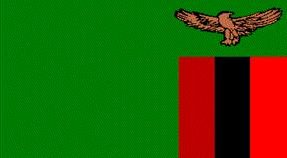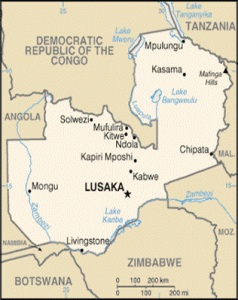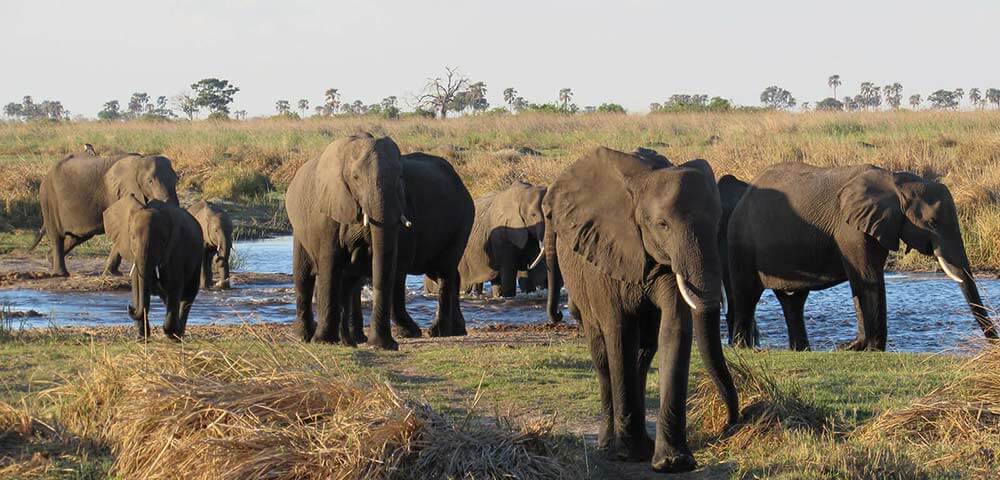
GEOGRAPHY
Zambia is a vast plateau bordered by Angola to the west, Zaire to the north, Tanzania to the northeast, Malawi to the east, Mozambique to the southeast, Zimbabwe and Botswana to the south and the Caprivi Strip of Namibia to the south. The Zambezi River, together with Lake Kariba, forms the frontier with Zimbabwe. The Victoria Falls, at the southern end of the man-made Lake Kariba, is one of the most spectacular sights in Africa (if not the world). To the east and northeast, the country rises to a plateau 1,200m (3937 ft) high, covered by deciduous savannah, small trees, grassy plains and marshland. The magnificent Luangwa and Kafue National Parks have one of the most prolific animal populations in Africa.
HISTORY
There is archaeological evidence to show that Zambia has been inhabited for around 12,000 years. More concrete evidence comes with the arrival of the Luba and Lunda peoples in the 14th and 15th centuries; the Bemba are descended from the Luba and the Lozi of the Lunda. In the mid 19th century, the British missionary and explorer David Livingstone traveled through Zambia, and the 1880’s and 1890’s saw a

wave of settlement by the British. A Royal Charter to explore, develop and administer the land was granted to the British South Africa Company in 1889, and in 1893 the British put an end to the slave trade that had flourished in the region. By 1924, control of the country, then called Northern Rhodesia, had been passed to the British Crown, and large-scale exploitation of Zambia’s copper resources began.
In the 1950’s, Kenneth Kaunda founded a breakaway movement from the African National Congress (ANC) called the Zambia African National Congress (ZANC). ZANC was committed to fighting for basic civil and voting rights for the African population and was swiftly banned by the government; Kaunda was arrested. While he was in jail, his followers reformed ZANC as the United National Independence Party (UNIP); Kaunda became chairman of UNIP after his release in 1960. UNIP too was made illegal, but it received widespread support across the population. After waves of demonstrations spread across the country in the early 1960s, Britain introduced a new constitution on a more democratic basis. When UNIP emerged as the majority party, it became clear that independence was inevitable, and the Republic of Zambia finally became an independent member of the Commonwealth in October 1964.
THE PEOPLE
Zambia’s population is made up of more than 70 ethnic groups, many of them Bantu-speaking. The largest groups are the Bemba, Nyanja, and Tonga peoples. More than 70 African languages are spoken, including Bemba, Lozi, Luvale, Tonga, and Nyanja.
SOCIAL CONVENTIONS
Shaking hands is the normal way of greeting. The pace of life is leisurely and patience is frequently required for seemingly trivial matters, as well as matters of greater seeming urgency.
LANGUAGE
The official language is English, which is widely spoken. There are more than 73 tribal dialects, of which the major ones are Myanja, Tonga, Bemba, Lozi, Kaonde, Luvale and Lunda.
GOVERNMENT
The government of Zambia is elected in a multi-party general election every five years. Up until 1991, when the first multi-party elections were held, the country was ruled by Kenneth Kaunda in a one party state.
The Movement for Multiparty Democracy (MMD) is ruling the government. Their economic policy is to move Zambia from a centralized, state driven economy to a more liberal open market economy that is private sector driven. The Government has put in place the necessary incentives to encourage private investment which includes privatization of State owned companies, rehabilitation of strategic infrastructure, a stable monetary policy and the recent enactment of the Competition and Fair Trade Act.
TIME ZONE
Two hours ahead of GMT.
ELECTRICITY
Zambia uses 230 volts AC (50 Hz).
CLIMATE
Although Zambia lies in the tropics, the height of the plateau ensures that the climate is seldom unpleasantly hot, except in the valleys. There are three seasons: the cool, dry winter season from May to September; the hot, dry season in October and November; the rainy season from December to April.
Clothes to Wear:
Lightweight or tropical clothing with rainwear is highly recommended. Sweaters and jackets are necessary during the cool and the rainy seasons.
LOGISTICAL
Entry & Exit Requirements
A passport and visa are required. The passport must be valid for at least six months after the intended date of departure from Zambia. A single-entry visa may only be obtained at the port of entry for $50. Travelers must apply in advance at a Zambian Embassy or consulate for a multiple-entry visa. The fee for a three-year multiple-entry visa is $80. Tourists visiting for the day from a neighboring country (such as those visiting Victoria Falls from Zimbabwe) can get a $20 day-trip visa at the border. Bring exact change.
UNIVISA (KAZA) – Zimbabwe & Zambia
Join visa for entry to both Zimbabwe and Zambia now available for purchase on arrival to either Victoria Falls Airport in Zimbabwe or Livingstone Airport in Zambia. Cost is $50 and valid for 30 days provided travelers remain within Zimbabwe and Zambia (day trips to Botswana through the Kazungula border are permitted, however, travelers who overnight in Botswana will need to purchase another UNIVISA or single entry visa when re-entering Zimbabwe).
The Government of the Republic of Zambia requires you to have at least two blank visa pages in your passport when you enter. These pages are in addition to the endorsement/amendment pages at the back of the passport. At the time of entry, the immigration officer will stamp your passport with the permitted length of stay. Typically, an immigration officer will admit a U.S. citizen for the exact number of days they request, up to a maximum of thirty days. Visitors with indefinite departure plans may want to request admission for thirty days on arrival in the country. Visitors who wish to stay longer than their initial period of entry may visit an immigration office to obtain no more than two thirty-day extensions (for a total time of 90 days). Zambian Immigration officials insist that visitors carry the original or a certified copy of their passport and immigration permit at all times. Certified copies must be obtained from the immigration office that issued the permit.
If your passport is lost or stolen while you are in Zambia, visit the Zambian Department of Immigration office to apply for a replacement entry permit before attempting to depart the country; there is no charge for this permit.
All U.S. citizens, except resident diplomats, must pay an airport departure tax which is collected in U.S. dollars. Airlines include this tax in the cost of the ticket; however, passengers will need to verify that this tax has been paid at the airport. The passenger will receive a “no-fee” receipt reflecting this payment.
U.S. citizens living or traveling in Zambia are encouraged to register with the U.S. Embassy in Lusaka at the Department of State’s travel registration page in order to obtain updated information on local travel and security. U.S. citizens without Internet access may register directly with the Embassy. Registration is important; it allows the State Department to assist U.S. citizens in an emergency. The Embassy of the Republic of Zambia, 2419 Massachusetts Avenue, NW Washington DC 20008. Tel: (202) 265-9717. Fax: (202) 332- 0826
Embassy & High Commission Locations:
Zambian Embassy of the United
States of America
Cnr Independence and United
Nations Avenues, Lusaka, Zambia
Tel: (+260 21) 1 250 955, ext. 2234
After hour emergencies: ext. 1
Fax: (+260 21) 1 253 824
High Commission of Canada to Zambia
5199 United Nations Avenue
Lusaka, Zambia
Tel: (+260 21) 1 250 833
Fax: (+260 21) 1 254 176
http://www.canadainternational.gc.ca/zambia-zambie/index.asp
Health:
While not required for entry, it is highly recommended for all travelers to be up to date on their routine vaccinations, including, but not limited to: Influenza, Chickenpox (Varicella), polio, Measles / Mumps / Rubella (MMR); Diphtheria / Pertusis / Tetanus (DPT). For additional information on vaccines please consult the CDC’s information on vaccines.
Malaria is endemic in Zambia. Travelers who become ill with a fever or flu-like illness while traveling in a malaria-risk area and up to one year after returning home should seek prompt medical attention and tell the physician their travel history and what anti-malarials they have been taking. For additional information on malaria, protection from insect bites, and anti-malarial drugs, please visit the CDC Travelers’ Health web site.
Frequent outbreaks of cholera occur during rainy season (usually Nov-Apr) throughout the country, but are unlikely to affect U.S. citizen visitors, unless they eat or drink in areas with questionable water sources and hygiene. For further information on cholera, consult the CDC’s information on cholera.
Human immunodeficiency virus (HIV) and Tuberculosis (TB) are also serious health concerns in Zambia. For further information on HIV, please consult CDC’s information on HIV; for further information on TB, please consult CDC’s information on TB.
Certain over-the-counter medications, such as the anti-histamine Benadryl, may not be brought into the country. A complete list of controlled substances banned in Zambia is on the Zambia Drug Enforcement web site (http://www.deczambia.gov.zm/docs/Cap%2096%20of%20the%20Laws%20of%20Zambia.pdf).
Information on vaccinations and other health precautions, such as safe food and water precautions and insect bite protection, may be obtained from the Centers for Disease Control and Prevention’s (CDC) hotline for international travelers at 1-800-CDC-INFO (1-800-232-4636) or via the CDC website at http://wwwnc.cdc.gov/travel. For information about outbreaks of infectious diseases abroad, consult the infectious diseases section of the World Health Organization (WHO) website at http://www.who.int/topics/infectious_ diseases/en/. The WHO website also contains additional health information for travelers, including detailed country-specific health information.
Banks & Currency:
Kwacha (ZMK) = 100 ngwee. Notes are in denominations of ZMK50,000, 20,000, 10,000, 5,000, 1,000, 500, 100, 50 and 20. Coins are in denominations of ZMK10, 5 and 1, and 50 and 25 ngwee.
Exchange of foreign currency is carried out at authorised banks and bureaux de change. Most hotels, restaurants, and bigger shops accept credit cards. ATM’s are available within Lusaka and some of the major towns in Zambia. Standard Chartered and Barclays Bank have ATM’s which accept Visa. Traveler’s Checks are widely accepted. To avoid additional exchange rate charges, travelers are advised to take traveler’s checks in US Dollars.
Currency restrictions apply. Banking Hours vary from bank to bank, but most are open Mon-Fri 08:15 am – 02:30 pm. Some banks are open 08:15 am – 10:30 am on the first and last Saturday of the month.
Communication:
The post is neither cheap nor fast, though it is fairly reliable for letters and postcards. The charges are increased to keep pace with devaluations of the kwacha, but currently it costs around Kw700 to send a postcard and Kw900 for a letter. It’s worth noting that Zambia has some lovely stamps for sale, a favorite of stamp collectors. Couriers are a very reliable way of sending things safely, but they are expensive.
The Zambian telephone system is overloaded and has difficulty coping. Getting through to anywhere can be hard, and this difficulty generally increases in proportion to the remoteness of the place that you are trying to contact. If you must use the phone, then persistence is the key – just keep on trying and eventually you should get a line that works. To dial into the country from abroad, the international access code for Zambia is +260. From inside Zambia, you dial -00 to get an international line, then the country’s access code. The old pay phones used to always be out of order, but recently card phones have been springing up. You can dial internationally from these, and you buy cards containing credits for various different amounts.
Mobile phones, or ‘cells’, are widely used in the larger cities, where there is often a choice of networks. Coverage is slowly widening to encompass some of Zambia’s medium-sized towns, but expect coverage outside Lusaka and Livingstone to be patchy. Be careful of picking up Zimbabwean networks in Livingstone, as the prices maybe based on official Zimbabwean exchange rates, and hence be much more expensive than their Zambian equivalents.
If you are trying to send a fax to, or within Zambia, then always use a manual setting to dial the number. Listen for a fax tone on the line yourself. Only when you finally hear one should you press the ‘start’ button on your machine to send the fax.
Contrary to what you may have expected, the email community in Zambia is quite large. Note that although increasing numbers of people and businesses in Zambia are getting email, far fewer have access to the internet.
Cell Phone Usage:
Please contact your cell phone provider to determine whether your contract includes coverage in the country you are visiting. Depending on your contract you may have to add international services and/or country specific services.
ENTERTAINMENT
Food & Drink:
Zambian supermarkets of the new century are considerably well stocked with modern conveniences, even in some remote regions. All safari camps and luxury lodges offer top class cuisine. Traditional Zambian dishes include bream (fish) caught from the Zambezi, Kafue and Luapula rivers; as well as tasty Nile perch, lake salmon and other freshwater fish from the vast waters of Lake Tanganyika. Termites, caterpillars, fresh maize (known as dobe) and roasted maize or chiwaya cha kazinga are common condiments enjoyed at a traditional homestead.
Chibuku beer brewed from maize is common. Easy drinking beer, brewed commercially, include Mosi, Rhino Lager and Ndola Supreme. Zambian coffee is superb and can be bought at most retail outlets or departure lounges.
Nightlife:
All over Zambia, you will find so many things to do, see and experience, you may not have enough time to do everything. Zambia is full of interesting places, where one can easily pass many hours enjoying the entertainment that can be found in Zambia. There are also a wide range of bars, cafes and clubs all over Zambia. Lusaka and tourist resorts in Zambia have some of the most popular clubs in the country. Whatever type of bar or club you are looking for, you will find it in Zambia. Tourist offices in Zambia publish an annual and monthly diary of events.
Shopping:
Satisfying market demands, Zambia’s crafts people have combined artistic license with traditional mores to produce a range of fine crafts, from the master basket weavers of Barotseland to the ebony sculptures of the Southern Province. Fierce masks, objects d’art made from copper, brass or malachite, traditional musical instruments from drums to thumb pianos… even the stretched canvas is becoming a popular medium for Zambian self expression.
Zambia’s prolific wildlife inspires much of Zambian craft work: elephant, buffalo and hippo are favored with artistic license defining individual styles. International appreciation of Zambian craft extends to implements still used by rural villagers: conical fish-traps with their functional weave; baskets used for storage or food preparation; clay pots to store anything from grains to water; sleep mats; musical instruments; games… all confirming traditional skills and the rich ethnic culture that is the living foundation of modern Zambia.
BAGGAGE
Baggage rules for international and domestic air travel have changed much in recent years, differ from carrier to carrier and these days even may cover your on-board bags. Checking luggage may cost a separate fee or may be free depending on your personal status with the carrier. We therefore encourage you to read your ticket’s small print and/or contact your carrier for exact rules.
For tours that include light aircraft transfers and/or charter flights there is a maximum weight allowance of 33-44 lbs. per person. Soft-sided luggage is required and strict limitations are imposed. Preferably, travel light, if possible. If not, it is recommended to include a soft-sided bag inside your regular luggage to carry this allowable weight. For overland tours, space for luggage in safari vehicles is limited. Extra baggage will be stored wherever possible (additional charges may apply, please request information from your sales consultant).
All luggage checked in at Johannesburg’s OR Tambo International Airport must comply with the following requirements:
1. Bags must have at least one flat surface.
2. No long shoulder straps which can hamper movement on luggage belts.
3. If the soft bag has a shoulder strap, this needs to be taken off before checking in the luggage.
4. If the bag has more straps, like soft backpacks, they need to be wrapped in plastic.
TIPPING
Tipping is according to personal preference. The following guidelines are recommended but left to your discretion: Drivers/Guides on safari from US$10-$15 per person per day. Porters & Hotel staff from US$1-3 per person per service. Meals are 10-15% of your restaurant bill.
LAUNDRY
Most hotels and lodges will offer a laundry service.
PHOTOS & VIDEOS
You will find incredible photographic opportunities on your safari. Please be courteous when taking pictures of the local people. In some countries you must refrain from photographing sites such as Military bases and industrial installations. Also be aware of cultural sensitivities when taking pictures of or near churches and other religious sites.
USE OF DRONES
The use of drones is being legislated by many countries. In some cases drones are already forbidden and their unauthorized use may carry severe penalties. If you plan to travel with a drone please contact the embassy or consulate of the country you wish to visit.
![SITA Canada Final_color [Converted]new_for_wp SITA Canada Final_color [Converted]new_for_wp](https://sitatourscanada.com/wp-content/uploads/2019/12/SITA-Canada-Final_color-Convertednew_for_wp.png)
